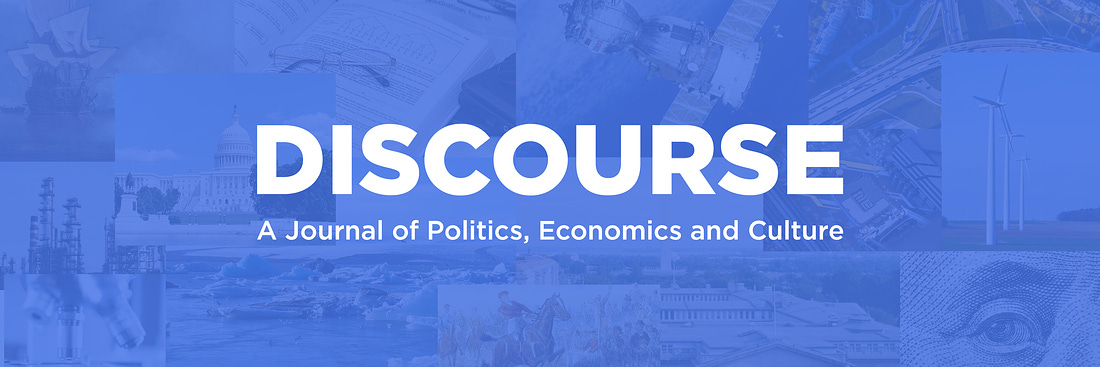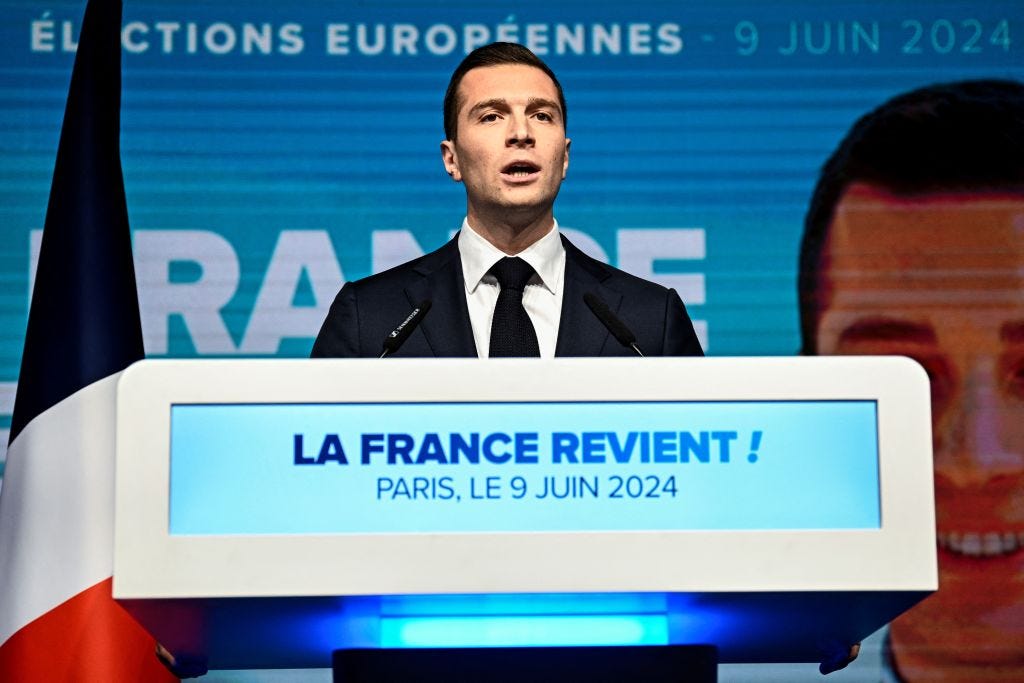|
 |
France’s Changing Political Landscape
The focus on the French far right’s success in recent European Parliament elections obscures other changes taking place in the country’s politics
 |
One of the interesting features of French politics these days is that it can manage to be both highly volatile and extremely boring at the same time. The most recent example of this paradox occurred on June 9, when a relatively low-stakes election for the European Parliament resulted in a dramatic turn of events. The far-right Rassemblement National (RN, formerly known as the Front National) came in first, winning 31.4% of the vote, while Renaissance, the party of President Emmanuel Macron—who was triumphantly reelected two years ago—only garnered a humiliating 14.6%. Reacting to this stinging defeat, Macron dissolved the current National Assembly (the French Parliament’s lower house) and called snap elections for June 30 and July 7.
What makes this turn of events at once breathtaking and utterly predictable is that while the far right’s rise has helped shape French politics for decades, the RN, for the first time, has a plausible path to power. Should they win, Macron would likely appoint Jordan Bardella, the RN’s new standard-bearer, as prime minister. Yet while undeniably important, this exclusive focus on the far right’s rise risks obscuring more subtle changes in French political culture that became apparent in this election cycle. These changes may not be entirely sufficient to explain the RN’s victory, but they are key to understanding the environment in which it has prevailed.
To begin with, it is striking how young so many of France’s top politicians are. For instance, take the eight têtes de listes—that is, the candidates topping their party slates, who participated in the televised debates that occurred during the recent campaign. One of these candidates is journalist and human rights advocate Raphaël Glucksmann, who heads the Place Publique (France’s Socialist Party)—the current fragmentary incarnation of the political powerhouse that in earlier periods brought François Mitterrand and François Hollande to power. At 44, he’s by far the oldest of the eight.
The remaining candidates could be divided into several tiers. First, there are the young men in their 20s. Bardella, for instance, is only 28 but has already served as the RN’s vice president and acting president. The candidate for (what remains of) the French Communist Party is another 28-year-old, Léon Deffontaines.
The next young demographic consists of women in their 30s. Like the young men, they also straddle the political divide. Manon Aubry, 34, is a spokesperson (and member of the European Parliament) for La France Insoumise (“Unbowed France”), which has emerged, thanks to its populist rhetoric, as the left’s dominant party, though its aggressive attitude has frequently made it controversial. The Green Party (Europe Ecologie-Les Verts) chose Marie Toussaint, a 37-year-old climate activist, as its leader. Macron’s party, Renaissance, is represented by Valérie Hayer, a 38-year-old lawyer who grew up on a farm in northwestern France and who is probably the least known of the liste leaders.
And then there is the 34-year-old Marion Maréchal, who is widely known as the niece of Marine Le Pen, the RN’s leader, and the granddaughter of RN founder Jean-Marie Le Pen. Maréchal was elected to the French Parliament on the RN slate in 2012 at the age of 22, but later withdrew from politics. Now she’s back, having made the choice to reject her family’s party and run for Reconquête! (Reconquest), the party launched by journalist Éric Zemmour that is running to the RN’s right on immigration and other issues.
Finally, there is François-Xavier Bellamy, a 38-year-old official of the Républicains, the traditional conservative party. In addition to his political activity, he is a high school philosophy professor in the Paris suburbs.
The allure of these younger candidates is not simply about attracting the “youth vote,” although this is part of it. These younger candidates also are seen as having a better sense than their elders of how to master the contemporary media culture. For example, Bardella has established a strong presence for the RN on TikTok in France, and not just for his views on politics and policy. In his posts, for instance, he talks about the cereal bars he enjoys munching on before meetings. And his videos use the language of dating (“What are you doing Sunday?”) to encourage people to attend rallies and to vote. They’re also very personal: After his resounding victory on June 9, he recorded a short video about his mother, on what also happened to be Mother’s Day in France.
The candidates’ youth is also a sign that long-established career paths in politics have become obsolete. Until recently, French politics was a notorious insiders’ game. Many figures in the center-left and center-right parties were educated in France’s system of elite public universities (les grandes écoles)—most notably the École Nationale d’Administration—worked for a time as top civil servants, then hitched their wagon to a political mentor and their party before eventually running for office themselves. Though this system also created opportunities for the occasional outlier and was less common in the parties further from the mainstream, it nonetheless contributed to a highly entrenched status quo, displaying a self-satisfaction with its inbred quality that was almost quaint.
All of this changed with the 2017 presidential election. At first, it looked like the status quo would once again assert itself, with the hapless socialist incumbent president, François Hollande, preparing to face off against the dour conservative, François Fillon. Then, out of nowhere, a virtually unknown 39-year-old investment banker and recently appointed minister named Emmanuel Macron proceeded to upend the establishment, destroy the existing party system, and reduce politics to a confrontation between an optimistic blend of cultural liberalism and free-market economics, on the one hand, and working-class resentment and anxiety on the other. French politics has yet to recover. In any case, Macron’s tenure seems to have laid to rest the general requirement that one has to pay one’s dues before aspiring to higher office.
The most recent crop of younger candidates convey a sense of urgency—as if the causes they are pursuing cannot be put on the back burner. They also seem focused on their work. Although information is not always available, only a few of them are married or in a long-term relationship (Maréchal is, interestingly, married to an Italian politician who was elected to the European Parliament as a member of Giorgia Meloni’s Brothers of Italy party). Only two seem to have children. And while all at least started university (Bardella discontinued a geography degree once his political career took off), only one, Bellamy, went to one of the prestigious grandes écoles that have trained so many French politicians.
Finally, few have had careers outside of politics. This need not be interpreted dismissively, and if anything, it is a welcome departure from the status quo, in which the careers of most past French politicians involved some dark art of state governance (finance inspection, administrative courts) and often led to allegations of corruption. A few have law degrees, but most cut their political teeth either working directly for a political party or for an activist organization. For instance, Aubry worked for Oxfam (and, by some accounts, the Carter Center, in Africa), while Deffontaines was involved in a grassroots effort to prevent a plant closure in his hometown of Amiens.
Another trend that was evident in the recent campaign was the blurring of traditional left-right dividing lines. Leftists disagree with other leftists on environmental issues and energy policy. For instance, Deffontaines, the communist, has criticized the ecologist party for its opposition to nuclear energy, upon which France is heavily dependent and which has become more important since Russia cut oil and gas exports to Europe in the wake of the war in Ukraine. “Anti-nuclear activists,” he claims, “are the ecologists of the past.” Nuclear energy is “the ecology of the future.”
Meanwhile, competing far-right parties disagree over the best way to make France great again. For instance, Maréchal has reproached the RN for embracing a statist and quasi-leftist economic policy, stating that her party successfully combines the defense of French identity with a plan to cut taxes.
Finally, whatever one thinks about the rise of nationalist parties, many politicians are now comfortable with invoking the idea of “the nation” or some aspect of nationalism to advance their agenda. The idea that security in a dangerous world can only be provided by the nation has, of course, always been a key argument of far-right parties.
Yet beyond these usual suspects, other parties—including some on the left—have, to different degrees, embraced the language of nationalism as well. Aubry, the left-wing populist, embraces a version of economic nationalism, denouncing free-trade agreements and blaming inflation on France’s subordination to EU energy policy. And during televised debates, several candidates from different parties spoke approvingly of President Biden’s imposition of a 100% tariff on Chinese-imported electric cars.
A handful of candidates still shy away from nation-focused rhetoric. For instance, Macron’s party emphasizes the EU’s central role in softening the economic blow of the COVID epidemic and the way the common market is crucial to French farmers.
While in the upcoming French legislative elections many will be tempted to emphasize the “rise of the far right” narrative, it is equally crucial to acknowledge how much the basic tenor of political life has changed. Fewer politicians and activists feel bound by the old rules. “Left” and “right” are no longer categories that reliably predict citizens’ beliefs and commitments. Terms that even in European politics seemed to be mutually contradictory—“internationalism” and “nationalism,” “environmentalism” and “nuclear energy,” “conservatism” and “statism”—can now be uttered in the same breath. If the far right comes to power in France in a few weeks, it will not simply be due to the culmination of a decades-long quest for electoral success, it will also be because the basic foundations of politics have shifted so dramatically.
You’re currently a free subscriber to Discourse .
